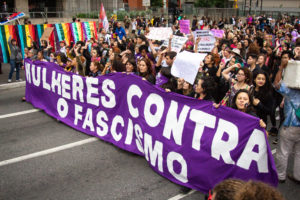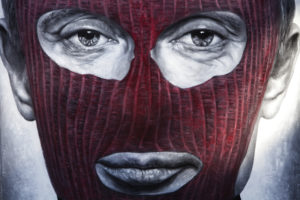Later this week, CANVAS trainer Siniša Šikman will be a keynote speaker at ECF Europe. Siniša will illustrate CANVAS’ organising principles: From working out what can bring people together to using humour and fun to undermine authority. He’ll also speak to the tough challenges of promoting unity and non-violent discipline within a campaign.
“Autocrats are learning fast and obsessed with what they perceive to be the biggest threat to their power: ‘people power’ revolutions.”
–Srdja Popovic, Center for Applied Nonviolent Action Strategies
Last week, MobLab interviewed Srdja Popovic by email. Popovic is co-founder and Executive Director of CANVAS, the Center for Applied Nonviolent Strategies. CANVAS grew out of the Otpor! student movement that helped topple the Serbian dictator Slobodan Milosevic.
Using creative subversion, CANVAS is training activists around the world and offering an extensive library of guidance on non-violent action and movement building. Their weekly situation reports update readers on global non-violent resistance actions.
MOBLAB: You must meet and work with a ton of campaigns around the world. Can you give us one example of an innovative organizing strategy you’ve seen lately?
SRDJA POPOVIC: The world does not lack creativity when it comes to activism. From Russian activists using toy protests to challenge Putin in 2012, through Spanish first world holographic protest in front of the national assembly, all the way to “tweeting potholes” which held local officials accountable for their election promises – creative activism is one of the most dynamic fields of research nowadays. And lots of fun!

MobLab recently spoke with Srdja Popovic, co-founder and Executive Director of CANVAS. Siniša Šikman, a CANVAS trainer, is a keynote speaker at ECF Europe 2017.
Can you share a little background on CANVAS, its mission and what you’re working on now?
POPOVIC: In a world that is changing even as we speak, our goals stay the same. We try to help activists around the globe giving them our knowledge and experience in non-violent struggle. It makes no difference if the opponent is a dictator, or irresponsible city authority that does not do its job. A similar toolbox and tactics could be used. Our goal is to help others stand up for what they believe is right, the way Otpor did against the regime of Slobodan Milosevic.
CANVAS’ work focuses on three main areas of education. We teach activists across the world in skills on how to build effective pro-democracy movements – and have worked with people from more than 50 different countries in the last 13 years. We build a variety of tools for those who are engaged in activism, ranging from manuals, books and educational videos to our newest attempt to combine technology and activism: The Whistler app.
Would you preview Siniša Šikman’s talk at ECF Europe?
POPOVIC: Siniša, one of our best trainers, will talk at ECF Europe in Berlin about the basics of building a social movement, main principles of success in doing it, how to make struggle attractive for participation, as well as the role of new media and technology in shaping social movements today.
“Educating people how to hold their governments accountable and stand up for their rights and create positive change is definitely the number one need in the future work of our sector.”
You do a lot of campaign training online and in person. How are people accessing campaign information and learning these days? What’s missing? Where could the social and political change sector do better?
POPOVIC: We educate people through workshops, academic courses and online classrooms (one of the examples is our course “Leading Nonviolent Movement for Social Progress” that we co-teach through/with the Harvard Kennedy School every year) – completely online and gathering people from more than 15 different countries at the same time. Online learning seems like a very interesting “ally” because it enables people to acquire skills and knowledge faster, cheaper and without being exposed to security risks (the government often restricts travel of very engaged human rights and democracy activists who are the primary consumers of CANVAS education).
Educating people how to hold their governments accountable and stand up for their rights and create positive change is definitely the number one need in the future work of our sector. Whether through free educational courses online or via other means of communication, we must equip as many people in the world as possible with those skills.
Autocrats are learning fast and are obsessed with what they perceive to be the biggest threat to their power: “people power” revolutions. In fact, countries like Russia have introduced mandatory school courses in “how to prevent color revolutions” in many state-controlled schools, aside from spending tons of resources trolling every attempt of “people power” mobilization. The fact that autocrats are so “allergic” to people understanding and challenging corrupt power proves that empowering people through education on movement building should be on the top of our priority list.
What’s the biggest change in social change campaigns over the past two years?
POPOVIC: I guess not many people will like what I have to say on this topic. We are living in a world in which many believe it is enough to sit behind the computer, like on social media and, by doing that, you are changing things and helping others.
Don’t get me wrong, social media is important in activism. Twenty years ago, you would have to make posters, use your phone to call people. Today, communication is much easier with the help of social media. Clicking, liking, sharing is useful to spread the word, but if you really want to change something, you can’t just sit behind the computer, you have to go out and do something for real.
Who inspires you?
POPOVIC: People who don’t surrender, those who never give up in fighting for what they feel is right, no matter how big their opponent or how tough the challenges they are facing.
Recently, Saudi Arabia gave women the right to drive. That sounds like regular news to some, maybe those who read it might ask themselves why women until now were not allowed to drive in Saudi Arabia. But fighting for rights is not easy and changing something in Saudi Arabia was certainly hard – activist Manal al-Sharif probably knows best. If it wasn’t for her, women wouldn’t be behind the wheel in this country. It had to take a lot of courage to stand up, be brave and fight for what is right. Manal al-Sharif is just one of the people that inspires me. I meet them every day and try to help them as much as I can.
If you could grow your network of colleagues, who would you want to add right now? Alternatively, what do you see as effective ways for activists and campaigners to connect / collaborate / build networks?
POPOVIC: Three main challenges for us are 1) how to create impact while staying small, non-bureaucratic and flexible; 2) how to fundraise and maintain our commitment to “supporting activists regardless of pressure from autocratic governments”; and 3) creating new tools.
In all three fields, we need larger networks of activist organizations, donors and techies, but also academic institutions across the world. This is why we partner with a wider family of organizations, like the Human Rights Foundation, in amazing attempts to bring together activists, donors, techies and professors. The “Oslo Freedom Forum” is one example. It’s the world’s largest assembly for the brave and daring, also referred to as “Davos for dissidents.”
How can activists and campaigners follow you and plug into your network?
POPOVIC: By visiting our web page and contacting us. We are also present on Facebook and Twitter.




